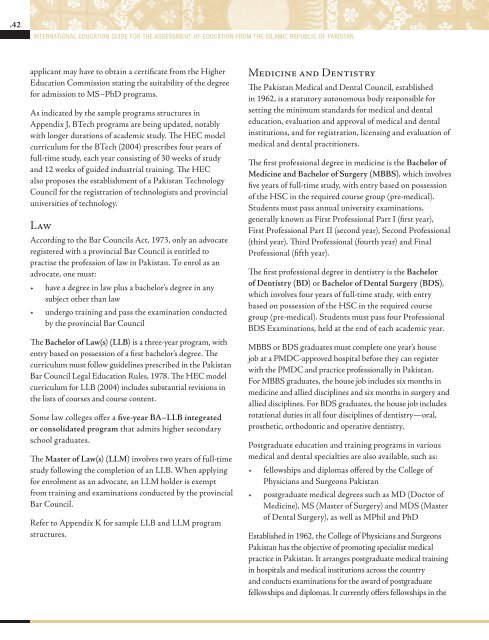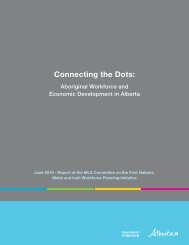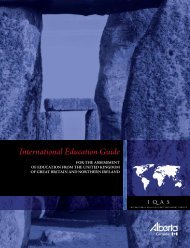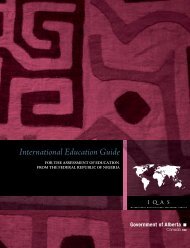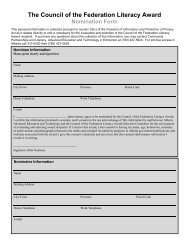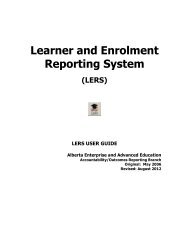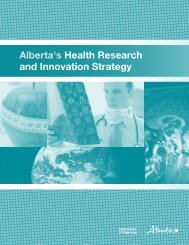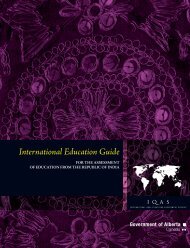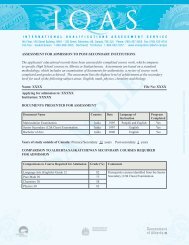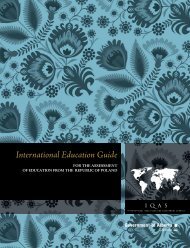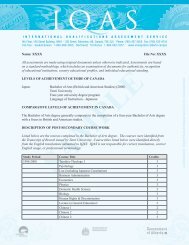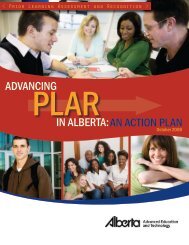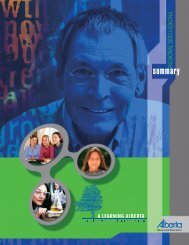International Education Guide - Enterprise and Advanced Education ...
International Education Guide - Enterprise and Advanced Education ...
International Education Guide - Enterprise and Advanced Education ...
You also want an ePaper? Increase the reach of your titles
YUMPU automatically turns print PDFs into web optimized ePapers that Google loves.
.42<br />
INTERNATIONAL EDUCATION GUIDE for the assessment of education from the Islamic Republic of Pakistan<br />
applicant may have to obtain a certificate from the Higher<br />
<strong>Education</strong> Commission stating the suitability of the degree<br />
for admission to MS–PhD programs.<br />
As indicated by the sample programs structures in<br />
Appendix J, BTech programs are being updated, notably<br />
with longer durations of academic study. The HEC model<br />
curriculum for the BTech (2004) prescribes four years of<br />
full-time study, each year consisting of 30 weeks of study<br />
<strong>and</strong> 12 weeks of guided industrial training. The HEC<br />
also proposes the establishment of a Pakistan Technology<br />
Council for the registration of technologists <strong>and</strong> provincial<br />
universities of technology.<br />
Law<br />
According to the Bar Councils Act, 1973, only an advocate<br />
registered with a provincial Bar Council is entitled to<br />
practise the profession of law in Pakistan. To enrol as an<br />
advocate, one must:<br />
• have a degree in law plus a bachelor’s degree in any<br />
subject other than law<br />
• undergo training <strong>and</strong> pass the examination conducted<br />
by the provincial Bar Council<br />
The Bachelor of Law(s) (LLB) is a three-year program, with<br />
entry based on possession of a first bachelor’s degree. The<br />
curriculum must follow guidelines prescribed in the Pakistan<br />
Bar Council Legal <strong>Education</strong> Rules, 1978. The HEC model<br />
curriculum for LLB (2004) includes substantial revisions in<br />
the lists of courses <strong>and</strong> course content.<br />
Some law colleges offer a five-year BA–LLB integrated<br />
or consolidated program that admits higher secondary<br />
school graduates.<br />
The Master of Law(s) (LLM) involves two years of full-time<br />
study following the completion of an LLB. When applying<br />
for enrolment as an advocate, an LLM holder is exempt<br />
from training <strong>and</strong> examinations conducted by the provincial<br />
Bar Council.<br />
Refer to Appendix K for sample LLB <strong>and</strong> LLM program<br />
structures.<br />
Medicine <strong>and</strong> Dentistry<br />
The Pakistan Medical <strong>and</strong> Dental Council, established<br />
in 1962, is a statutory autonomous body responsible for<br />
setting the minimum st<strong>and</strong>ards for medical <strong>and</strong> dental<br />
education, evaluation <strong>and</strong> approval of medical <strong>and</strong> dental<br />
institutions, <strong>and</strong> for registration, licensing <strong>and</strong> evaluation of<br />
medical <strong>and</strong> dental practitioners.<br />
The first professional degree in medicine is the Bachelor of<br />
Medicine <strong>and</strong> Bachelor of Surgery (MBBS), which involves<br />
five years of full-time study, with entry based on possession<br />
of the HSC in the required course group (pre-medical).<br />
Students must pass annual university examinations,<br />
generally known as First Professional Part I (first year),<br />
First Professional Part II (second year), Second Professional<br />
(third year), Third Professional (fourth year) <strong>and</strong> Final<br />
Professional (fifth year).<br />
The first professional degree in dentistry is the Bachelor<br />
of Dentistry (BD) or Bachelor of Dental Surgery (BDS),<br />
which involves four years of full-time study, with entry<br />
based on possession of the HSC in the required course<br />
group (pre-medical). Students must pass four Professional<br />
BDS Examinations, held at the end of each academic year.<br />
MBBS or BDS graduates must complete one year’s house<br />
job at a PMDC-approved hospital before they can register<br />
with the PMDC <strong>and</strong> practice professionally in Pakistan.<br />
For MBBS graduates, the house job includes six months in<br />
medicine <strong>and</strong> allied disciplines <strong>and</strong> six months in surgery <strong>and</strong><br />
allied disciplines. For BDS graduates, the house job includes<br />
rotational duties in all four disciplines of dentistry—oral,<br />
prosthetic, orthodontic <strong>and</strong> operative dentistry.<br />
Postgraduate education <strong>and</strong> training programs in various<br />
medical <strong>and</strong> dental specialties are also available, such as:<br />
• fellowships <strong>and</strong> diplomas offered by the College of<br />
Physicians <strong>and</strong> Surgeons Pakistan<br />
• postgraduate medical degrees such as MD (Doctor of<br />
Medicine), MS (Master of Surgery) <strong>and</strong> MDS (Master<br />
of Dental Surgery), as well as MPhil <strong>and</strong> PhD<br />
Established in 1962, the College of Physicians <strong>and</strong> Surgeons<br />
Pakistan has the objective of promoting specialist medical<br />
practice in Pakistan. It arranges postgraduate medical training<br />
in hospitals <strong>and</strong> medical institutions across the country<br />
<strong>and</strong> conducts examinations for the award of postgraduate<br />
fellowships <strong>and</strong> diplomas. It currently offers fellowships in the


